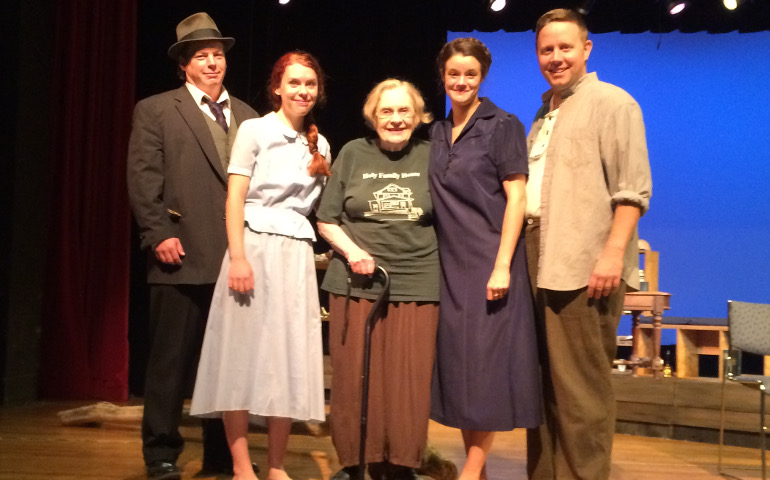
Patty McCarty, center, is surrounded by the cast: from left, Jason Will (Peter Maurin), Maura Atwood (Tamar), Susie Duecker (Dorothy Day), Ken T. Williams (Forster Batterham) on July 16 at Concordia University of Wisconsin, in Mequon, Wisconsin, where the Acacia Theatre Company presented "This Other Love." (Photo by Pamela Schaeffer)
Patty McCarty's play "This Other Love" puts Catholic Worker founders Dorothy Day and Peter Maurin onstage with Day's common-law husband, Forster Batterham. Thunder and lightning erupt.
Batterham, an atheist and anarchist, resists Day's wish to raise the child in her womb as a Catholic. "That outfit still thinks Galileo was wrong," Batterham points out.
Later, after he stomps offstage, Day tells Maurin that Batterham is "a great teacher. We study the stars, moss growing on trees, the skeletons of sea gulls and fishes. The problem seems to be that everywhere I look, I see God."
McCarty, 85, NCR's copy editor from 1993 to 2008, wrote the play in 1994. It finally premiered July 14 in Mequon, Wisconsin, north of Milwaukee.
"I think Dorothy's helping us," McCarty said after she attended the first three performances of the play. The audiences — numbering 110, 50, and 130 for the first three shows — had a "talk back" after each show with McCarty, the director, the actors, and local ministers to the poor.
Related: Dorothy Day's struggle with faith takes the stage
Director Janet Bouman Peterson said at a talk-back session that she had read another play about Day and was wishing for something different.
"Last summer," she said, "I found this play in the ‘keep to read' file" during the company's move to a new office. In the program, Peterson wrote, "The birth of a child. The birth of faith. The birth of a movement. ... In this play, Patty McCarty has imagined what might have happened if all these events in Dorothy Day's life had occurred at the same time."
From left, NCR contributor Patricia Lefevere, Patty McCarty, and Pam Schaeffer. (Photo by Fritz Schaeffer)
McCarty told the July 16 audience, "Right now there's absolutely no one in the world I'd rather be than me. I just love this play. I just love the cast — the way they've put it on." McCarty suggested that the discovery and performance of the play might be a Dorothy Day miracle.
In the play, Day tries to calm Batterham with the thought that, on that day — Aug. 8, 1927 — Italian immigrants Nicola Sacco and Bartolomeo Vanzetti might not be executed. Batterham fires back: "Honey, if I thought the government would do right by a couple of poor blokes, I wouldn't hate and fear it so much."
Related: NCR In Conversation: A podcast conversation with the playwright
Former NCR managing editor Pam Schaeffer said after the play July 16, "Patty's artistic construct to put the three together in the same setting brought all the conflict and tension into high relief," with Maurin coming into the middle of Day's and Batterham's relationship.
The Acacia Theatre Company presented the play at Concordia University of Wisconsin over two weekends in July.
[Jane Stoever worked for NCR as a reporter and features editor 1974-1977.]



